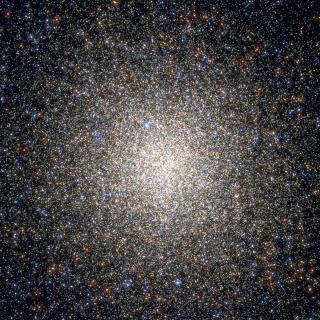Bibcode
Carrera, R.; Pancino, E.
Bibliographical reference
Astronomy and Astrophysics, Volume 535, id.A30
Advertised on:
11
2011
Journal
Citations
126
Refereed citations
120
Description
Context. Open clusters are ideal test particles for studying the
chemical evolution of the Galactic disc. However, the number and
accuracy of existing high-resolution abundance determinations, not only
of [Fe/H], but also of other key elements, remains largely insufficient.
Aims: We attempt to increase the number of Galactic open clusters
that have high quality abundance determinations, and to gather all the
literature determinations published so far. Methods: Using
high-resolution (R ~ 30 000), high-quality (S/N ≥ 60 per pixel), we
obtained spectra for twelve stars in four open clusters with the fibre
spectrograph FOCES, at the 2.2 Calar Alto Telescope in Spain. We employ
a classical equivalent-width analysis to obtain accurate abundances of
sixteen elements: Al, Ba, Ca, Co, Cr, Fe, La, Mg, Na, Nd, Ni, Sc, Si,
Ti, V, and Y. We derived oxygen abundances by means of spectral
synthesis of the 6300 Å forbidden line. Results: We provide
the first determination of abundance ratios other than Fe for NGC 752
giants, and ratios in agreement with the literature for the Hyades,
Praesepe, and Be 32. We use a compilation of literature data to study
Galactic trends of [Fe/H] and [α/Fe] with Galactocentric radius,
age, and height above the Galactic plane. We find no significant trends,
but some indication for a flattening of [Fe/H] at large Rgc,
and for younger ages in the inner disc. We also detect a possible
decrease in [Fe/H] with |z| in the outer disc, and a weak increase in
[α/Fe] with Rgc.
Based on observations collected with the fiber spectrograph FOCES at the
2.2 m Calar Alto Telescope. Also based on data from 2MASS survey and the
WEBDA, VALD, NIST, and GEISA online database.Table 12 is available in
electronic form at http://www.aanda.orgFull Table 5 is only
available at the CDS via anonymous ftp to cdsarc.u-strasbg.fr
(130.79.128.5) or via http://cdsarc.u-strasbg.fr/viz-bin/qcat?J/A+A/535/A30
Related projects

Milky Way and Nearby Galaxies
The general aim of the project is to research the structure, evolutionary history and formation of galaxies through the study of their resolved stellar populations, both from photometry and spectroscopy. The group research concentrates in the most nearby objects, namely the Local Group galaxies including the Milky Way and M33 under the hypothesis
Martín
López Corredoira